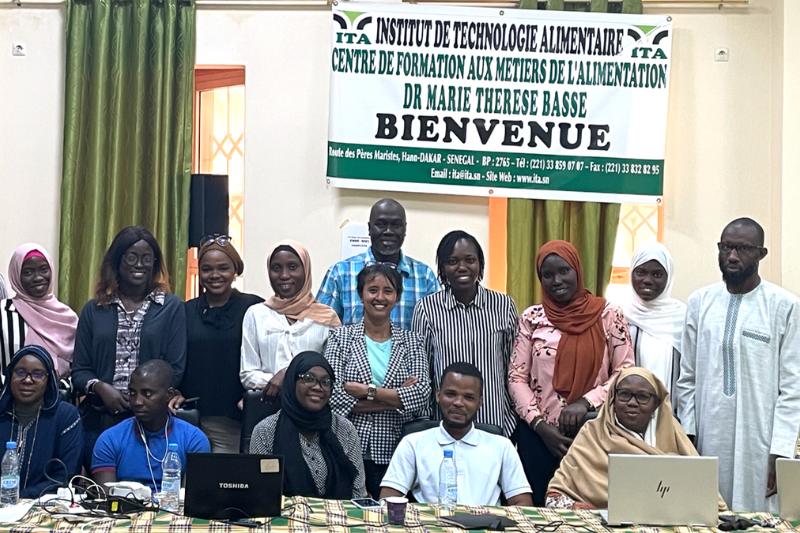
The rapid growth of Senegal’s dairy sector has outpaced the implementation of food safety practices and policies to reduce the risk of foodborne disease from the consumption of raw and fermented milk. Recent outreach by a project funded by the FSIL has equipped partners at the Food Technology Institute (ITA) and the Senegalese Institute of Agricultural Research (ISRA) with knowledge and tools to detect and identify foodborne pathogens in the domestic milk supply.
“To date, Senegal’s milk production and processing industries have not yet been thoroughly studied beyond a literature review and a handful of student theses,” said Woubit Abebe, professor and director of the Center for Food Animal Health, Food Safety and Food Defense in the Department of Pathobiology at Tuskegee University and co-principal investigator (PI) of the FSIL dairy safety project. “Our partners in Senegal will be identifying the issues and pathogens relevant to the sector that deserve a closer look.”
The goal of the four-year project, led by project PI Manpreet Singh, department head and professor of Food Science and Technology at the University of Georgia, is to build food safety capacity in Senegal’s dairy sector, reduce foodborne disease and improve market access. At the heart of the project’s current work is a survey of small, traditional dairy producers that will offer insights into microbial safety, socioeconomics and gender roles in Senegal’s dairy sector. It includes responses from 158 producers from three regions responsible for 38% of the country’s milk supply.
“I think this project will provide a breakthrough in understanding the major pathogens associated with milk quality and safety in Senegal,” Abebe said.
Abebe visited project partners at ISRA and ITA in the spring to prepare the researchers to conduct testing on milk samples from the producers who participated in the survey. The team worked through detailed protocols outlining the method that will be used for microbial quality assessment — from sample size determination and sample collection to genetic analysis of pathogenic bacteria.
At ITA, the academic home to the project’s in-country co-lead Dr. Cheikh Ndiaye, Abebe introduced lab staff to food safety lab techniques to identify milk from cows with mastitis and other infections that increase the risk of foodborne illness. They included somatic cell counts, which identify milk from cows with udder infections by the presence of immune system cells, and California mastitis testing, which measures inflammation as a proxy for infection. Their use is widespread in the United States and other countries, but not yet common in Senegal, and both can be performed using commercial kits.
“The kit is a very cheap and accessible tool that will help you determine the milk quality,” Abebe said.
In addition, in a presentation to some 20 ITA staff, Abebe focused on the importance of diagnosis, prevention and management of mastitis, laboratory biosafety and biosecurity.
All molecular genetic work to identify which pathogens are present in milk samples will be completed at the ISRA labs, whose established field stations are equipped with refrigerators and staffed with technicians to collect the milk samples. At ISRA, Abebe worked with staff, including Dr. Fatou Tall Lo, head of the microbiology department, and engineer Aida Diop, focusing on genetic analysis to identify foodborne pathogens in milk samples. As the project advances, the labs will process samples to isolate, characterize and identify priority organisms for Senegal’s milk safety.
“We were honored to have Dr. Abebe in our lab and have her share her experience with mastitis diagnosis and milk quality assessment, we intend to strengthen this collaboration through the project’s activities,” said Dr. Lo. “The procedures she shared are being adapted in the laboratory, particularly for genetic diagnosis. The supplies she brought for detection of certain foodborne pathogens will allow us to better improve research for better food security.”
The data on foodborne pathogens in milk, along with the survey data on current dairy food safety knowledge, attitudes and practices, will be used to develop outreach programs to strengthen food safety during milk production. Ultimately, Abebe is hopeful that it will not only advance the project’s goal of raising awareness about food safety issues, but it will also inform science-based food safety regulations and create economic opportunities for women and youth, who play a vital role in Senegal’s dairy sector. Long-term, sustainable change will require strong local research capacity, and her partnership with colleagues at ISRA and ITA fuels her optimism.
“I found the people to be wonderful, very cooperative and ready to proceed and help out,” she said. “Their capabilities are exactly what we need to conduct the research.”
This post was written by Olivia Hall, freelance writer with the Feed the Future Innovation Lab for Food Safety (FSIL). The Innovation Lab for Food Safety is one of a network of 20 such labs led by U.S. universities under Feed the Future, the U.S. government’s global hunger and food security initiative led by USAID.

